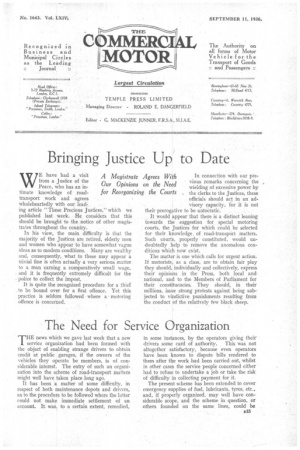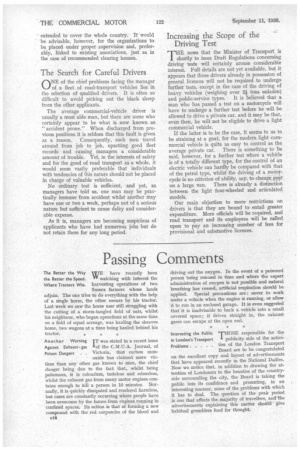The Need for Service Organization
Page 25

Page 26

If you've noticed an error in this article please click here to report it so we can fix it.
THE news which we gave last week that a new service organization had been formed with the object of enabling strange drivers to obtain credit at public garages, if the owners of the vehicles they operate be members, is of considerable interest. The entry of such an o-rganization into the scheme of road-transport matters might well have taken place long ago.
It has been a matter of some difficulty, in respect of both maintenance depots and drivers, as to the procedure to be followed where the latter could not make immediate settlement of an account. It, was, to a certain extent, remedied, in some instances, by the operators giving their drivers some card of authority. This was not altogether satisfactory, because even operators have been known to dispute bills rendered to them after the work had been carried out, whilst in other cases the service people concerned either had to refuse to undertake a job or take the risk of difficulty in collecting payment for it.
The present scheme has been extended to cover emergency supplies of fuel, lubricants, tyres, etc., and, if properly organized, may well have considerable scope, and the scheme in question, or others founded on the same lines, could be extended to cover the whole country. It would be advisable, however, for the organizations to be placed under proper supervision and, preferably, linked to existing associations, just as in the case of recommended clearing houses.
The Search for Careful Drivers
ONE of the chief problems facing the manager of a fleet of road-transport vehicles lies in the selection of qualified drivers. It is often so difficult to avoid picking out the black sheep from the other applicants.
The average commercial-vehicle driver is usually a most able man, but there are some who certainly appear to be what is now known as "accident prone." When discharged from previous positions it is seldom that this fault is given as a reason. Consequently, such men travel around from job to job, upsetting good fleet records and causing managers a considerable amount of trouble. Yet, in the interests of safety and for the good of road transport as a whole, it would seem vastly, preferable that individuals with tendencies of this nature should not be placed in charge of valuable vehicles.
No ordinary test is sufficient, and yet, as managers have told us, one man may be practically immune from accident whilst another may have one or two a week, perhaps not of a serious nature but sufficient to cause delay and considerable expense.
As it is, managers are becoming suspicious of applicants who have had numerous jobs but do not retain them for any long period.
increasing the Scope of the Driving Test
THE news that the Minister of Transport is shortly to issue Draft Regulations concerning driving tests will certainly arouse considerable interest. Full details are not yet available, but it appears that those drivers already in possession of general licences will not be required to undergo further tests, except in the case of the driving of heavy vehicles (weighing over 2i tons unladen) and public-service types. It is believed that a man who has passed a test on a motorcycle will have to undergo a further test before he will be allowed to drive a private car, and it may be that, even then, he will not be eligible to drive a light commercial vehicle.
If the latter is to be the case, it seems to us to be straining at a gnat, for the modern light commercial vehicle is quite as easy to control as the average private car. There is something to be said, however, for a further test where a vehicle is of a totally different type, for the control of an electric vehicle can hardly be compared with that of the petrol type, whilst the driving of a motorcycle is no criterion of ability, say, to changemr on a large van. There is already a distinction between the light four-wheeled and articulated models.
Our main objection to more restrictions on drivers is that they are bound to entail greater expenditure. More officials will be required, and road transport and its employees will be called upon to pay an increasing number of fees for provisional and substantive licences.




















































































